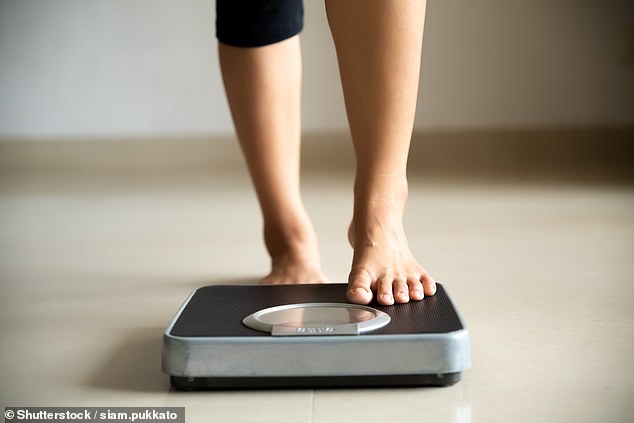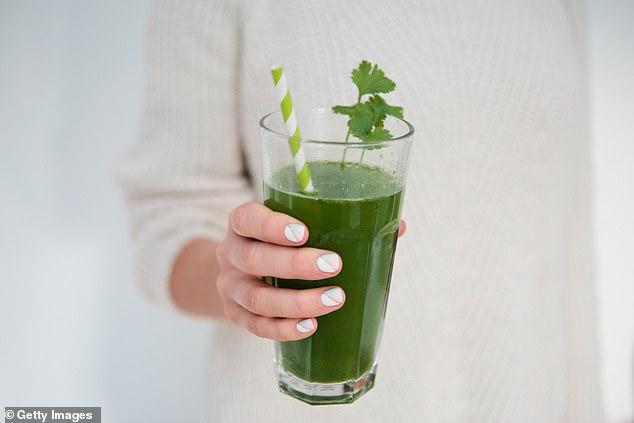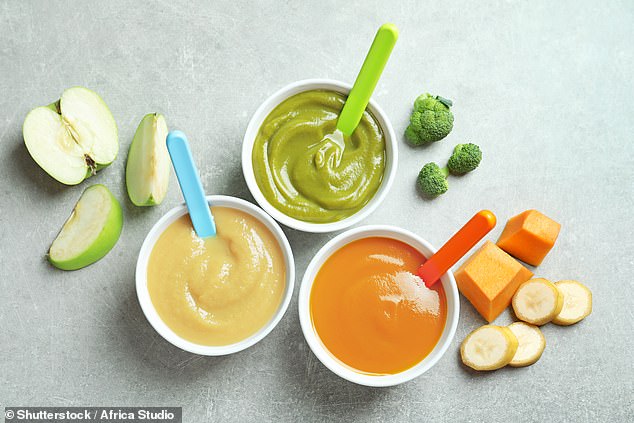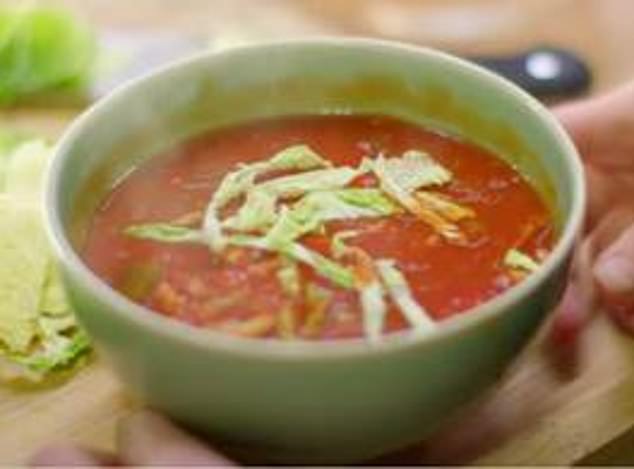
Considering a quick fix to get in shape this summer? You might want to reconsider, experts say.
Consuming just 800 calories a day, only eating baby food and blitzing fruit and veg for a so-called juice detox are just some of the most popular crash diets.
They gain their name for promising huge weight loss, fast.
But nutritionists say these supposed ‘miracle diets’ only provide short-term results — and many followers are left weighing more than they did before.
And potential side effects include being low on energy, having poor concentration, hair loss and skin problems, experts claim.
Here, nutritionists reveal the seven crash diets they would avoid at all costs.

Drastically cutting calories can not only help you shed fat but muscle too. This can have a long-term impact on your metabolism, nutritionists warn
Very low-calorie diets
Severely restricting calories to rapidly lose weight is a popular crash diet — but it can cause serious health problems.
It involves eating less than 1,000 calories per day, with some plans involving slashing intake further, such as the 800-calorie diet.
But very low-calorie diets can mean missing out vital nutrients and trigger fatigue and metabolic slowdown, experts say.
Clinical nutritionist Lee Holmes, author of the Supercharged Food book series, said: ‘It can lead to nutrient deficiencies as rapid weight loss often involves severe calorie restriction, which can lead to inadequate intake of essential nutrients.
‘This can result in deficiencies in vitamins, minerals, and other important nutrients that are necessary for maintaining overall health.’
Severe calorie cutting may also trigger the unwanted side effect of muscle loss.
‘If people really drop their calories and they are not eating enough protein they tend to not only lose fat, but they also lose muscle,’ says London-based Harley Street nutritionist Kim Pearson.
‘If you are not taking in enough protein, which is central to supporting muscle mass, you will have a reduction in your muscle mass.
‘This will show up like you are losing weight on the scale, but you are reducing your metabolic rate, your body’s ability to burn calories reduces and then as soon as you start eating normally again you are more likely to regain weight.’
Miss Pearson warns that both the 800-calorie diet and 5:2 diet — which involves eating 800 calories a day twice a week — make it hard to get all your vital nutrients.
She said: ‘If you are going to reduce your calories that low you have to be extremely competent at making sure you are still getting the nutrients that the body needs.’
Those following a low-calorie diet may also end up eating more processed foods and ready-made products, such as sandwiches, instead of cooking from scratch because it makes calorie counting easier.
Meal replacement shakes
Replacing food with meal replacement shakes has been popular with dieters for decades.
Even the NHS is rolling them out, offering them to type 2 diabetes patients to help them lose weight — with some hailing the results as ‘life-changing’.
But while such shakes can be low in calories — thus triggering rapid weight loss — they can also slow the metabolism and lack vital nutrients.
Nutritionists argue that while some claim to be packed with nutrients, these are in synthetic forms — meaning they are lower in quality than those found in food and can be harder for the body to absorb.
As a result, Miss Pearson would not advise people to use meal replacement, such as SlimFast shakes which are now being promoted by the rapper Big Narstie.
‘I really don’t like poor-quality, low-calorie meal replacement shakes. Not all meal replacements are created equal,’ she said.
‘There are some that are alright — these tend to be the ones that are provided by doctors and nutritionists and are protein based.’
Mis Pearson added: ‘The nutrients they provide are usually in synthetic forms, so they are not the forms of nutrients that you would naturally find in foods they are synthetic low-quality supplements.
‘A lot of them are also very processed containing thickeners, emulsifiers and preservatives.’
Detox diets
Detox diets are based on the idea that ‘toxic waste’ needs to be cleared from the body in order to lose weight or stay healthy — a concept experts say is nonsense.
Popular approaches include consuming only fruit and vegetable juices, only liquids or a lemon drink for a fixed period time — ranging from a few days to weeks.
However, as with other crash diets, detoxes often make it impossible to consume the range of nutrients that the body requires.
These diets ‘often lack essential nutrients, protein and fibre, which can lead to nutrient imbalances, low energy levels, and gastrointestinal issues’, says Ms Holmes.
Although lemon juice in itself is a good source of vitamin C, Ms Holmes says it is not enough.




Nutritionists say juice cleanses are not all sustainable or safe. The majority of weight lost from these kinds of diets is down to dehydration which can cause weakness, headaches and even fainting, experts say
She said: ‘Relying solely on it for an extended period can result in severe nutrient deficiencies and inadequate calorie intake.’
Additionally, such detox diets are often packed with sugar.
Miss Pearson said: ‘Juice detoxes contain a surprising amount of sugar.
‘Even if the sugar is from fruit, it can dysregulate your blood sugar levels.
‘Yes, fruit is healthier than a Mars bar, but once it has gone into your gut and been absorbed into your blood sugar the body can’t tell the difference between sugar from a Mars bar and sugar from a juice.’
The majority of weight lost from these kinds of diets is down to dehydration which can cause weakness, headaches and even fainting, experts say.
Atkins diet
Reportedly loved by celebrities including Kim Kardashian, Jennifer Aniston and Rob Lowe, the Atkins diet involves eating plenty of protein and fat while cutting carbs.
The diet — created by American physician and cardiologist Robert Atkins in the 1960s — aims to put the body into a state known as ketosis.
This is a metabolic state that occurs when the body switches from burning carbohydrates for energy to burning fat.
Just five to 15 per cent of daily calorie intake is from carbohydrates, among those following the diet, compared to the 50 per cent recommended by most guidelines.
But although this diet may help with weight loss, experts say it can have long-term health effects, including an increased risk of heart disease.
Ms Holmes said: ‘Carbohydrates are a vital energy source for the body and severely restricting them may lead to initial weight loss.
‘But the long-term health effects of consuming high amounts of saturated fats and animal proteins are a concern, as it may increase the risk of heart disease, kidney problems, and nutrient deficiencies.’
Keto diet
Just like Atkins, Keto is a low-carb and high-fat diet that aims to jump-start ketosis — when the body burns fat for energy not carbohydrate.
Celebs including Gwyneth Paltrow, Megan Fox and Kourtney Kardashian are all said to have tried it out.
But many nutritionists do not give it a ringing endorsement.
‘Once we demonise a whole food group, food no longer becomes our friend,’ says Ms Holmes.
She said: ‘Carbs are not the enemy and everything, including carbs, should be eaten and enjoyed in moderation.
‘Not to mention that by cutting out carbs, we lose out on the benefits of many nutrients that we need to support our gut function and immune system.’
Followers of the Keto diet risk missing out on important prebiotics that are found in root vegetables, seeds and fruit.
Ms Holmes added: ‘Unfortunately, many keto enthusiasts are ditching prebiotic rich vegetables because of their carbohydrate content which is not great news for a healthy and diverse gut.
‘I see a lot of people in my clinic who have gone keto and are now suffering with gut health issues.’
Baby food
The bizarre fad diet of eating baby food instead of lunch and breakfast first gained popularity in 2010, when it was rumoured that actress Jennifer Aniston used to lose seven pounds in a week.
The original diet involves eating a jar of baby food at breakfast and lunch — replacing your normal meals — and eating a ‘normal’ dinner.






Baby food can contain anywhere between 20 to about 120 calories, so just eating jars of baby food will cause you to lose weight as you will be eating considerably less food and less nutrients
Over a decade later, the diet is still rife on TikTok, with some followers only eating baby food in a bid to lose weight.
The jars can contain anywhere between 20 to 120 calories, so it is an ultra-low calorie diet.
Ms Holmes said: ‘While baby food can be nutritious, it is not designed to meet the nutritional needs of adults.
‘It is low in calories, protein and fibre, and lacks the variety of nutrients required for optimal health.
‘This diet can lead to nutrient deficiencies, muscle loss and difficulties with portion control and long-term adherence.’
Cabbage soup
Designed to help shed weight fast, this liquid diet of cabbage soup is a no-go for nutritionists.
The Cabbage soup diet has been a celeb favourite since the 80s. For one week, dieters can eat almost nothing but homemade cabbage soup and a few bits of fruit.
It results in extreme weight loss, with some dropping a 10lbs in just one week. However, nutritionists say it also compromises your health.
But experts say most of the weight lost in the monotonous diet is just as a result of losing so-called water weight and will probably be regained when you start eating normally.
‘The Cabbage Soup Diet lacks protein, healthy fats and essential nutrients, and it is not sustainable or healthy in the long term, leading to potential nutrient deficiencies and negative impacts on overall health,’ says Ms Holmes.






Experts say most of the weight lost in the monotonous cabbage soup diet is just water weight and will probably be regained once you start eating normally again
She added: ‘It is highly restrictive and monotonous, making it challenging to follow for an extended period and may result in feelings of boredom, cravings and deprivation.’
The extreme lack of calories can lead to an energy drop, fatigue and nutrient deficiencies, experts say.
And the unsustainable diet will not help with weight loss in the long term.
Miss Pearson said: ‘Crash dieting feeds into an all or nothing mentality.
‘People go on a crash diet before a holiday and then they go on holiday and then they go crazy because they have been depriving themselves.
‘As soon as they hit the breakfast buffet, they just want to eat everything in sight.’
Many of these fad and crash diets are unsustainable and unhealthy.
To lose weight in a healthy and sustainable way, the British Dietetic Association (BDA) recommends setting a realistic weight loss goal — such as 1lb a week — and making an action plan to stay on track.
Eating balanced meals — filling up your plate so half is salad and vegetables, a quarter is lean meat, fish, egg or tofu and the final quarter is starchy foods, such as potatoes, wholegrain rice or pasta — is key.
Limiting sweet, fatty and salty snacks is also vital, the BDA says.
f you don’t feel like eating air for two weeks in the run up to your holidays there are sustainable ways to lose weight, such as cutting out sugar, refined starchy carbohydrates and processed foods, experts say.
Source: | This article originally belongs to Dailymail.co.uk